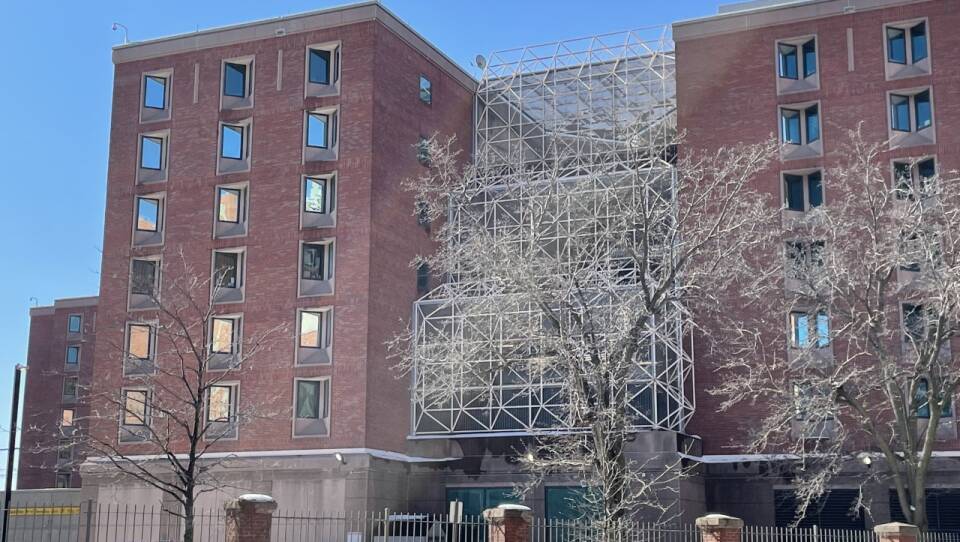A coalition of advocacy organizations working with the homeless population near Melnea Cass Boulevard and Massachusetts Avenue, or Mass. and Cass, are raising concerns that a new city arrangement to hold people arrested in the area at Nashua Street Jail may create "devastating health and mental health outcomes."
The arrangement was established last month as part of the Boston Police Department’s increased enforcement around Mass. and Cass and a city-sanctioned clearing of homeless encampments, according to a statement from Mayor Michelle Wu on Tuesday. The intention is to bring those arrested — who may be facing a variety of criminal charges — to the jail, “where there are dedicated supports for medical care, food and supervision,” according to Wu, instead of booking them at district police stations.
But advocates question the transparency and legality of the process. In a letter sent last week to Wu, the Boston Police Department and Suffolk County Sheriff Steve Tompkins, advocates from several service organizations said the central booking process doesn’t fulfill its promise to provide needed resources or care for detainees, and it limits their access to bail.
“If medical intervention is necessary, people should be brought to institutions of care (hospitals, emergency triage) and not a jail or booking facility,” advocates said. “Jails and coerced treatment cannot save lives — they endanger them."
The groups said that moving people to jail disrupts the care they have been receiving and sometimes may even trigger "preventable overdose deaths."
More News
Suffolk County Sheriff's Department spokesman Peter Van Delft told GBH News that bringing people to Nashua Street Jail provides supervision from trained staff and access to on-site medical care and treatment “that would not otherwise be available to the arrestees in the local police lockups."
Consolidating the booking to a single facility also improves community safety, he said, “by ensuring more police officers are on the street and available to respond to calls rather than sitting in their lockups watching the arrestees."
The sheriff's department does not — and cannot legally — accept detainees in need of immediate medical attention, Van Delft said. Those people are transported by police to local hospitals. He also said the plan was not designed to "criminalize addiction or to coerce treatment ... The vast majority of arrestees held in our facility under these agreements have been arrested on non-drug-related charges.”
Such agreements are not new, he said, adding that the department currently provides what he described as "lockup services" to multiple government agencies and universities across the state.
Since 2021, the state budget has set aside $1.8 million each year for the sheriff’s office to create “agreements to provide detention services to various law enforcement agencies.” But bills to formally establish a regional lockup in Suffolk County have languished on Beacon Hill for years, never passing into law. Last year, an appeals court ruled that “if the city believes that … it should be allowed to use the county jail to house incapacitated individuals held in protective custody, it must obtain authorization from the Legislature.” No such approval has been granted.
Concerns from advocates “go beyond the very obvious doubt that there is legal authorization for this lock up,” the groups wrote in their letter. “We are alarmed with the opacity of this process and we question what features and contours central booking will have that supports its claim to ‘save lives.’”
The letter was signed by the Massachusetts Bail Fund, the Material Aid and Advocacy Program, Families for Justice as Healing and CourtWatch MA.
As a legislator and resident in the neighborhood that surrounds Mass. and Cass, state Sen. Liz Miranda says multiple constituents have reached out to ask her where the crowds that once congregated near the intersection have gone.
“It’s been eerie,” she said in an interview with GBH News Thursday, adding that the process has not been transparent.
“I had thought that the legislature would need to grant approval for the continuation [of central booking],” she said. “I’m concerned that I wasn’t really informed. Like, did I miss a phone call? An email? I didn’t know anything about this.”
Miranda said she had a visit to Nashua Street scheduled for this month, but the sheriff and mayor postponed it until January.
Over time, the demographics of the population at Mass. and Cass have shifted to include more formerly incarcerated individuals and Black and brown men, Miranda said. In recent years, police enforcement has subsequently increased.
“At first, people were more sensitive,” she said, “and then there was more anger, more impatience from people as it started to get very different in terms of racial demographics.”
During a sweep in the first few days of November, 73 people were placed in low-threshold housing units, 20 were sent to stay in shelters and 7 were reunified with friends and family, according to city officials.
Wu has maintained that nobody is being arrested simply for violating the new ordinance banning encampments. However, city records show that there have been multiple arrests around Mass. and Cass since the ordinance took effect, including one woman who was arrested for trespassing just outside the transitional housing building where she was placed after her tent was taken down. A Boston Municipal Court judge released the woman on her own recognizance with an order for her to stay away from the area, including the one-block radius surrounding her assigned housing.
In addition to prohibiting the construction of encampments, the ordinance authorizes police to make arrests without a warrant on public nuisance charges including trespassing, drinking alcohol or swearing in public.









